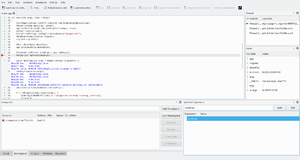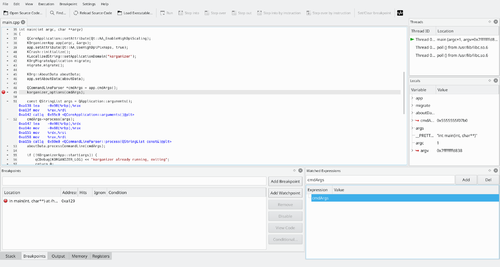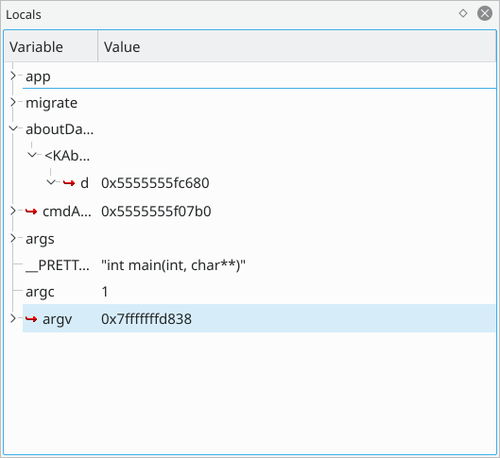|
|
| Line 1: |
Line 1: |
| <languages /> | | <languages /> |
| | {{Proposed deletion|Not a KDE app}} |
| | <translate> |
|
| |
|
| == Various Useful Resources == | | <!--T:1--> |
| | {|class="vertical-centered" |
| | |[[Image:Kdbgtotal.png|300px]]||KDbg is a graphical tool for debugging your programs |
| | |} |
|
| |
|
| The following links refer to other web pages or resources relevant for the development of KBibTeX.
| | == Features == <!--T:2--> |
|
| |
|
| * [https://phabricator.kde.org/project/view/176/ Phabricator project page]
| |
| ** [https://phabricator.kde.org/source/kbibtex/ Diffusion's view on the Git repository]
| |
|
| |
|
| * [https://cgit.kde.org/kbibtex.git Git repository's webpage]
| | <!--T:3--> |
| | [[Image:Kdbgtotal.png|center|500px|thumb|Source code, breakpoint, local variables, watched expressions, and the thread list]] |
|
| |
|
| * [https://bugs.kde.org/buglist.cgi?bug_status=UNCONFIRMED&bug_status=CONFIRMED&bug_status=ASSIGNED&bug_status=REOPENED&bug_status=NEEDSINFO&bug_status=VERIFIED&order=Importance&product=KBibTeX&query_format=advanced Bug reports] | | <!--T:13--> |
| | * Inspection of variable values in a tree structure. |
|
| |
|
| * [https://build.kde.org/job/Extragear%20kbibtex%20kf5-qt5%20SUSEQt5.9/ Continuous Integration] | | <!--T:15--> |
| | * Direct member: For certain compound data types the most important member values are displayed next to the variable name, so that it is not necessary to expand the subtree of that variable in order to see the member value. For example, you don't need to go into a variable of type QString if you want to see the string that the variable holds. (BTW, this is of course not hardcoded, but can be extended to new types.) KDbg can even display Qt's QString values, which are Unicode strings. |
|
| |
|
| * [https://ebn.kde.org/krazy/reports/extragear/office/kbibtex/index.html English Breakfast Network] | | <!--T:16--> |
| | * Debugger at your finger tips: The basic debugger functions (step, next, run, finish, until, set/clear/enable/disable breakpoint) are bound to function keys F5 through F10. Quick and easy. |
|
| |
|
| * [https://scan.coverity.com/projects/kbibtex Coverity Scan] | | <!--T:17--> |
| | * Of course, lots of other basic functions: View source code, search text, set program arguments and environment variables, display arbitrary expressions. Everything you need to debug a program! |
|
| |
|
| * [https://t-fischer.dreamwidth.org/tag/kbibtex Blog postings on KBibTeX]
| | <!--T:18--> |
| | * Debugging of core dumps, attaching to running processes is possible. |
|
| |
|
| == Getting the Source Code ==
| | <!--T:5--> |
| | [[Image:Kdbglocalswatches.png|center|500px|thumb]] |
|
| |
|
| KBibTeX's sources are available through KDE's Git infrastructure, the repository's name is {{path|kbibtex}}. How to clone a Git repository is explained in the [https://techbase.kde.org/Development/Git/Recipes#Cloning_a_Repository Git Recipes in TechBase]. In short, run the following command in your terminal:
| | <!--T:6--> |
| | [http://www.kdbg.org/ The project home page] gives more details. |
|
| |
|
| {{Input|git clone git://anongit.kde.org/kbibtex}}
| | <!--T:14--> |
| | A [http://www.kdbg.org/manual/ User Manual] is available on the project website. |
|
| |
|
| You can browse KBibTeX's source code at [https://cgit.kde.org/kbibtex.git KDE's Git server].
| | <!--T:7--> |
| | {{Community-app-footnote}} |
|
| |
|
| === Branches ===
| | <!--T:8--> |
| | | [[Category:Development]] |
| Main development happens in the ''master branch'' (named {{path|master}}). It is an objective that this branch is functional and mostly stable, although it is not guaranteed. Use this branch to enjoy new features.
| | </translate> |
| | |
| For releases, ''release branches'' are created. The naming scheme is {{path|kbibtex/}}''versionnumber'', where ''versionnumber'' may be something like {{path|0.6}}. Actual releases are tagged commits ('tags') within such a branch, for example {{path|v0.5.1}}. There won't be branches for bug fix releases, e.g. no {{path|kbibtex/0.6.1}}.
| |
| | |
| For bugs or features that require multiple commits and where individual commits may break {{path|master}} or a release branch, so-called ''feature branches'' are used. These branches are supposed to track {{path|master}} (typical for features) or a release branch (typical for bugs). Branches for bugs are meant to be merged into the release branch where the bug was reported for as well as into the master branch (for future releases). Feature branches are merged into the master branch, in selected cases into releases branches where no release has been tagged yet, and only in rare cases back-ported to release branches with published releases. An example for a feature branch would be {{path|feature/zotero}}, which may contain the code for an improved Zotero support. Names for bug report-related branches are {{path|bugs/}}''bugsystemnumber'' (for example {{path|bugs/kde338375}}) , where ''bugsystem'' would be {{path|kde}} or the name of a Linux distribution and ''number'' the actual bug number. Feature branches start with {{path|feature/}} followed by a short descriptive name for this feature (all lowercase, no spaces). Merged branches will be delete after some time.
| |
| | |
| == Compiling the Code ==
| |
| | |
| The following instructions provide information how to compile KBibTeX on the command line. Instructions are similar but differ slightly between KDE4-based builds (e.g. branch {{path|kbibtex/0.5}}) and KDE Frameworks 5-based builds (e.g. branch {{path|master}}). When compiling KBibTeX from inside of an IDE like KDevelop or Qt Creator, those settings have to be applied as well.
| |
| | |
| === Running CMake ===
| |
| | |
| KBibTeX is configured using CMake. There are a few options relevant for the configuration of this project:
| |
| | |
| # <code>CMAKE_INSTALL_PREFIX:PATH</code> specifies the installation location. There are a number of choices available for this option:
| |
| ## The location of your KDE installation, for example {{Path|/usr}}. The commands <code>kde4-config --prefix</code> (compiling for KDE4) or <code>kf5-config --prefix</code> (compiling for KDE Frameworks 5) print this location. Picking this option most likely will require root permissions (e. g. via sudo) for the actual installation. Caution: This choice will interfere with the package management.
| |
| ## A directory outside the package management's control, for example {{Path|/usr/local}}. Requires setting some environment variables as explained below. This installation stays available across reboots and is available to all users. Picking this option most likely will require root permissions (e. g. via sudo) for the actual installation.
| |
| ## A user-writable directory like {{Path|/tmp/usr}} or {{Path|~/usr}}. Similar to above choice, it requires setting some environment variables, but no root permissions. Many distributions are configured to clean {{Path|/tmp}} on reboot.
| |
| # <code>CMAKE_BUILD_TYPE</code> determines the amount of debug information included in the final code. Regular users may set it to <code>release</code>, developers to <code>debug</code>, and for step-by-step debugging <code>debugfull</code> works best. All available options are discussed in the [https://techbase.kde.org/Development/CMake/Addons_for_KDE#Buildtypes CMake documentation in TechBase].
| |
| | |
| A complete example looks like this:
| |
| {{Input|1=cmake -DCMAKE_INSTALL_PREFIX:PATH=/tmp/usr -DCMAKE_BUILD_TYPE=debug ../kbibtex}}
| |
| | |
| === Compiling ===
| |
| | |
| GNU Make is the default choice for source code compilation. The number of parallel processes should be specified to shorten the time to finish on multi-core systems. The priority of the compilation tasks may get reduced.
| |
| | |
| {{Input|nice -n 16 make -j$(nproc)}}
| |
| | |
| To make use of of [https://ninja-build.org/ ninja], the <code>cmake</code> statement above has to include the argument <code>-GNinja</code>. Combining both cmake and ninja may look like this:
| |
| | |
| {{Input|1=cmake -GNinja -DCMAKE_INSTALL_PREFIX:PATH=/tmp/usr -DCMAKE_BUILD_TYPE=debug ../kbibtex && ninja}}
| |
| | |
| == Installation ==
| |
| | |
| KBibTeX uses KDE's KParts technology, which requires you to install some libraries. KBibTeX may not run properly if the following steps are omitted.
| |
| | |
| Running
| |
| {{Input|make install}}
| |
| will install KBibTeX into the directory as specified as installation prefix earlier. Depending on your choice of installation prefix, this statement has to be run with sudo or alike.
| |
| | |
| Unless the installation prefix equals the KDE install directory, the following environment variables have to be specified. You may set the variables temporarily in an active shell session, permanently setting them in your shell's configuration, or create a small shell script that both sets those variables and then launches your custom KBibTeX installation.
| |
| | |
| # '''Only for KDE4''': Set variable <code>KDEDIRS</code> to include the KDE installation directory and KBibTeX's installation directory, for example {{Path|/usr:/tmp/usr}}
| |
| # '''Only for KF5''': Set variable <code>QT_PLUGIN_PATH</code> to include the plugin directory inside the library directory of KBibTeX's installation directory, for example {{Path|/usr/lib/plugins:/usr/lib/qt5/plugins:/tmp/usr/lib64/plugins/}}
| |
| # Set variable <code>LD_LIBRARY_PATH</code> to the library directory inside KBibTeX's installation directory, for example {{Path|/tmp/usr/lib64}}
| |
| # Set variable <code>XDG_DATA_DIRS</code> to include the shared data directories of the KDE installation directory, KBibTeX's installation directory, and other relevant prefixes, for example {{Path|/usr/share:/usr/local/share:/tmp/usr/share}}
| |
| | |
| Run <code>kbuildsycoca4</code> (KDE4) or <code>kbuildsycoca5</code> (KDE Frameworks 5) to make the KDE subsystem aware of the new libraries.
| |
| | |
| {{attention|KBibTeX consists of the actual program and a number of libraries. To avoid undefined behavior, it is important to uninstall any other KBibTeX installations (e.g. those done via the Linux distribution's package management system) and to remove any remaining KBibTeX libraries (e.g. those files found anywhere under {{Path|/usr}}) that match the pattern {{Path|*kbibtex*.so*}}.}}
| |
| | |
| Now KBibTeX can be started, like shown in this example:
| |
| | |
| {{Input|/tmp/usr/bin/kbibtex}}
| |
| | |
| == Git cookbook ==
| |
| | |
| A number of pages in [https://techbase.kde.org TechBase], [https://userbase.kde.org UserBase], and [https://community.kde.org Community] discuss using Git for source code management. This section shows some examples how Git is used for KBibTeX.
| |
| | |
| === Create a Feature or Bug Branch ===
| |
| | |
| In below example, replace {{path|xxxx}} with a short and concise name for a feature to be developed (as discussed above). Branches for bugs are created similarly, but follow the scheme {{path|bugs/kdeNNNN}}, where NNNN is the bug number in [https://bugs.kde.org KDE's bug tracker]. Bugs in other bug trackers such as [https://gna.org/bugs/?group=kbibtex Gna!] or your distribution may use a different prefix such as {{path|bugs/gnaNNNN}} or {{path|bugs/gentooNNNN}}.
| |
| | |
| {{Input|1=git branch --track feature/xxxx origin/master && git checkout feature/xxxx}}
| |
| | |
| === Pushing a Local Feature or Bug Branch ===
| |
| | |
| To minimize polluting the official KBibTeX repository or when you do not have write access, you may push your local branches to another Git repository to allow others to inspect your changes. In below example, {{path|personalpublicclone}} is your personal, public Git repository where you want to push to.
| |
| | |
| To publish you changes, use a command like this:
| |
| | |
| {{Input|git push personalpublicclone feature/xxxx:feature/xxxx}}
| |
| | |
| Others can add your repository to their local clone of KBibTeX's git and clone your branch (assuming in this example it is located on KDE's Git server):
| |
| | |
| {{Input|git remote add someonespublicclone [email protected]:clones/kbibtex/NAME/kbibtex # run once | |
| git fetch someonespublicclone feature/xxxx && git checkout feature/xxxx # every time to get updates
| |
| git remote rm someonespublicclone && git checkout master && git branch -D feature/xxxx # to erase branch}}
| |
| | |
| === Create Release Branches and Tags ===
| |
| | |
| To create a release branch from {{path|master}} and push it to {{path|origin}}, run
| |
| | |
| {{Input|git checkout -b kbibtex/0.6 master && git push origin kbibtex/0.6}}
| |
| | |
| To tag a release in a release branch, run the following commands:
| |
| | |
| {{Input|git checkout kbibtex/0.6 # be in right branch
| |
| git pull --ff-only # get latest changes from origin
| |
| git status # just check that everything is ok
| |
| git tag -s -u GPGKEY -m "Tagging 0.6" v0.6 # actual tagging, GnuPG signed
| |
| git push --tags # explicitly push tag to origin}}
| |
| | |
| == Creating a Release ==
| |
| | |
| {{Info|This section describes how to create releases based on KDE4 (kdelibs4). It will not work for KDE Frameworks 5.}}
| |
| To create a release, use the Ruby scripts from the {{path|git.kde.org:releaseme.git}} repository. KBibTeX's package generation is configured through files {{path|kbibtex.rb}} and {{path|kbibtexrc}}. Configure those files or invoke {{path|kbibtex.rb}} with the correct arguments, such as:
| |
| | |
| {{Input|1=./kbibtex.rb --src=file:///${HOME}/git/kbibtex --version=0.6.0 --no-doc --no-l10n}}
| |
| | |
| Fetching documentation and translation files is the most time-consuming part of this process.
| |
| | |
| Detached cryptographic hashes can be created and signed like this:
| |
| | |
| {{Input|1=sha512sum kbibtex-0.6.0.tar.xz >kbibtex-0.6.0.tar.xz.sha512
| |
| gpg --default-key GPGKEY --output kbibtex-0.6.0.tar.xz.sha512.asc --detach-sign --armor kbibtex-0.6.0.tar.xz.sha512
| |
| gpg --default-key GPGKEY --output kbibtex-0.6.0.tar.xz.asc --detach-sign --armor kbibtex-0.6.0.tar.xz}}
| |



![]() Support for this application can be found from the project's home page
Support for this application can be found from the project's home page

